Rishi Narayan, Founder of Underground Printing, Joins The Herd Has Spoken Podcast. Episode 8
Rishi Narayan, owner and founder of Underground Printing, talks about his rise in entrepreneurship as he started his extremely successful tee shirt printing business. Rishi talks to Brad about the hardships of a college startup and dives into his advice for the aspiring entrepreneur.
Enjoy the conversation between Rishi and Brad
Brad
Rishi, welcome to The Herd Has Spoken. it's great to have you on today.
Rishi
Hi, Brad, nice to see you and hear you.
Brad
Yeah. I've got to start by asking you. How are you doing? Right. We're in the middle of a recession, a global pandemic, and tons of protests in the streets. And oh, by the way, you run a number of retail stores. And we all know that retail has been hit really bad recently. So how are you?
Rishi
Not as bad as airlines and hotels? But yes, we're up there. You know, I'm healthy and the family's healthy and surviving quarantine, and home school. And so I think, to put it all in perspective, I'm much better than many people out there. And so you know, I really like to take it in that lens, but yeah man, you know, business is hard. This really exposes that. And really forces you to go back to your roots, you know, sales, if sales is what it was, or customer service, if that's what it was, or I would argue they are the same thing. And all part and parcel, right? But so yeah, hanging in there as my go to answer hope everyone is hanging in there out there. But, uh, we're surviving. And I think it's, for us, it's like, yeah, we'll figure out a way to come out on the other side of this, you know, in 12 to 18 months, or whenever the world kind of opens back up fully. I don't know what company we'll be or what everything will look like at that time. Hopefully, we'll be around.
Brad
For sure. So I want to dig into two words that you mentioned. And that's roots and family. So I know those are two things that are really, really important to you. So tell us a little bit about your roots and your family.
Rishi
For sure. So, my name may have been a giveaway on it. But my parents are from India. They moved from India to Indiana, where all I mean, for obvious reasons.
Brad
For sure.
Rishi
So similar, obviously, right.
Brad
And I've never known why Arkansas has said Arkansas as opposed to Kansas or Kansas or in front of it. Never, you know.
Rishi
Yeah, I agree. The India-na really pulled my parents in. No, my dad was a chemist and came to Purdue. Went to Purdue for his post-doc, and then eventually stayed there to be a professor. And my brother and I were both born in West Lafayette, Indiana. And when we were eight, we moved to Okemos, right outside East Lansing, which you know, all too well. And then I went to school in Ann Arbor. And I had a brief stint living in Berkeley, California. So I've literally only ever lived in college towns. So I'm a college town, kid. That's where I feel the most comfortable as I will tell anyone. It's the true fountain of youth. Just live in a college town, man. It's always good to feel young. So yeah, so I grew up in Indiana. My dad was a professor of chemical engineering both at Purdue and then at Michigan State and so I was a prototypical academic/academics kid, you know, definitely overachiever type, you know, wanted to take APs and do really well and be considered one of the smartest kids in school, I thought I was going to be a professor like my dad. And, you know, as I think both culturally that was important. And then there was just an internal pressure, you know, to, quote-unquote, succeed and do that myself. So, you know, that was my path. And so I went to, you know, went through high school and then wanted to go to U of M, and study Chemical Engineering at University of Michigan. And, you know, the reason not Michigan State where my father was a professor was because I just couldn't imagine myself in his, like, classes or anything like that. I was like, I don't want to I don't want to be, you know, Dr. Narayan's kid.
Brad
Right.
Rishi
Fast forward to two years later, when I realized that what an idiot I was, of course, I should have like, been in my dad's classes, like any advantage, I could have in college: course notes, like nepotism, I would have taken it all. It was a lot harder than I thought it was gonna be. And I was like, what an idiot? Of course, leg up, man. Take it. So no, I was glad of my choices. It was a good distance away, but still close enough to home and went to U of M to be an engineer.
Brad
That worked really well, huh. Yeah.
Rishi
Yeah. So yeah, as you allude to, I went and realized very quickly that I didn't really want to be an engineer. I worked at my dad's lab in high school, and I really loved it. I thought it was really cool. And I thought the things he did was cool. And it was only sitting in, like, intro to thermodynamics, my sophomore year that I was like: "what is this, this is nothing like what I thought it was going to be." And I slowly began to realize that what I loved was entrepreneurship. My dad was an entrepreneur, he licensed technologies back to himself and created businesses. And I thought that was chemical engineering. Little did I know, that was what he did. And that's not really, that's just a facet, very small facet of chemical engineering. So I was lucky enough to stumble into t-shirts along the way in college, through a chance encounter with a tow truck driver. My busted up Ford Probe GT Turbo, and a couple run-ins with breaking down and, and this is jack-of-all-trades type tow truck driver who used to print t-shirts in town. So my partner rang Greg and I, we, we were you know, we were easily distracted from our studies, let's just put it that way. And so there was something out there, we were going to do it, I was in like, student government and this and that, like anything else I could take you do to like, be busy. And we ended up deciding to take this guy out to dinner, offer to buy all of his t-shirt equipment, old, old t-shirt equipment, and start a t-shirt company. And that's what he did. And I'll fast forward 20 years, 19 years and still printing t-shirts to this day and still enjoying it.
Brad
I mean, I love your story so much, because it talks about hard work and dumb luck, and being willing to just take a chance and combining it all together.
Rishi
And a lot of dumb luck.
Brad
And that's true. And I've also found and I'd be interested in your take on this. I certainly believe the harder you work, the luckier you get.
Rishi
I agree. You know, I agree. But I also feel like there are a lot of hard workers out there that didn't, that didn't get lucky. For sure. I think hard work is a subset to a lot of, you know, a lot of us, you know, like we believe and we are hard workers, I think it's actually, the more you open yourself up to opportunities and potential chances of failure, the luckier you get. And maybe it's not luck, it's just that like some of them hit. But when you close down and you don't open yourself up to a lot of opportunities you don't feel as lucky but you also don't feel the ups and downs so to speak. So, you know, I think that there's really a training to like, just take a chance of stuff, take a chance of stuff and maybe throw your ego aside which is hard to do. Throw you know, maybe any savings aside, you know, these are these are difficult things and I, you know, I remember like when we started the company and started, that at a very early age, sophomore in college, just got to get, and get a lot of kudos for being so young. Oh, you know, wow, you're in a business which, you know, in college is really like, guys like you know, having a good time and slinging shirts and running all over campus. It didn't really become a real business still later on but but we got a lot of kudos for that. And honestly, I feel bad now because like it was easy then had no risk, no responsibility. All went up in flames. We could have moved on and been fine. The real risk and responsibility would be with a mortgage and responsibilities and a partner, spouse, kids, you know, a life; people to take care of like, when you risk it, then that's, that's trickier. That's a much difficult proposition. So I don't think it's something where it's like, oh, how you got to open yourself up to opportunities, that's a timing thing, that's an "are you in the right place thing" and hopefully, you are able to put yourself in a position to do that. And sometimes sheer hard luck and sheer will can get you there.
Brad
So yeah, I wanna I want to talk about the present time, and then go back to that experience that you had in college. So now, you know, Underground Printing, custom t-shirt manufacturer and retail stores in a whole bunch of college stores. You've got over 250 employees. Is that about right?
Rishi
It was. It's fluctuating these days. Yeah.
Brad
Fair enough with the retail.
Rishi
Yeah. We'll talk about all things in "end of 2019". Yes. You know, hopefully, again, back up to 250.
Brad
Yeah. Okay. Yeah. So it's your 250 employees-ish, you're in a number of different college towns, you've also started an angel investment group, you own a soccer club, the AFC Ann Arbor. And you're certainly still running this business. So you're a busy man. Oh, by the way, you're also teaching classes at the University of Michigan in entrepreneurship. And you mentioned something that I think is really important. You said, "hey, like, being able to get over your, your ego and get over the opportunity of failure and the fact that, frankly, you will fail?" So how did you learn that? Right? I mean, some of it might have been dumb luck. But I feel like for so many people that are listening to this, there's that one thing that they've been thinking about doing for a really long time. And something is standing in their way. So yeah, how did you get over it that very first time? And what was it that was standing in your way?
Rishi
So I'll tell you about the first time but I'll also tell you like, it isn't a past tense. It isn't, how did you get over it and never had to get over again, I have to get over it every single time. So I'll tell you about the first time and I'll tell you about the last time. So the first... I think getting over it the first time for me, was, um, I talked about, I've talked about this before, but basically, it was understanding that I was not going to be at the top of my class at U of M in chemical engineering, that I wasn't into it as much as maybe others were, and that wasn't going to be my path. I could take classes and do okay, and you know, graduate and get the degree. But that wasn't going to be what I wanted to do. I was fortunate enough to learn what I wanted to do while I was in school, by opening myself up to opportunities. But many friends, many people that you and I both know, only learn what they want to do after they graduate and take a career in what they think they're supposed to do, and then only learn that three down three years down the line, right, they get it wrong. I was lucky, lucky to have gotten it right. But, I do think that the way that I did it, the first time around was by just saying like, I can juggle a lot of things. And that's not necessarily always true. But it came from this idea that like, I stopped defining success as getting an A, or being at the top of my class, even though that's how I was raised to be and in hindsight/retrospect, I think a lot of that was my own internal pressure I put on came from cultural, came from my peers, came from whatever it might be, but it wasn't, but the majority of it was internal pressure I put on myself. And once I kind of made that realization/got over that had something else to kind of put my chips into a little bit. It wasn't just going to be school, I like I'm doing this thing as well. And I'm going to be good at that. And now, you know, I started to develop this kind of strategy at that time of the fast B which is basically like, you know, you don't need a get to the fast B because in real life nobody cares if you got A they just care if you got there, you know, and how and did you get there in time such for sure.
Brad
Thanks, Coach Powers, good lesson.
Rishi
Yeah. Thanks. That's right. That's right. Thanks, Coach Powers! A great lesson. And so that was the first time but here's the thing is like, I can preach about that all day long. But I went to start a podcast a year ago, and I've been talking about it for three years. And honestly, it was like: "well, you know, how big is it going to be and like how successful am I going to be at it and I essentially like talked myself out of it was like well, but if I don't have a lot of listens and you know, what are people gonna think about it?" And I just like I don't know what day it was. I don't know when it happened. It may very well be after some of the things over we talked about, you know, ourselves, you and I. And I was like, What am I... what am I doing? I'm preaching and talking and teaching kids about taking a chance. And what's the definition of success? And here I am being like, "I'm not gonna do this, because I'm worried about success and right, is it worth my time?" Like, yeah, it may not be worth your time. But you've been talking about it for years, you're really into it, give it a shot, give it a go. And that was really that. And that was two years ago, and after I would, you know, have been well, well on my career. So I I truly do think it's not a thing that you get over the hurdle. And you're done. It's, you have to do it again. And again, and startups the same way, just start a business every three to five years. Because you lose those skills, you lose the ability to like, put it all out there, it goes away. I think you have to like keep honing it.
Brad
I think in some ways, it's actually harder once we achieve some success, because oh, yeah, you have this expectation of the results. But success doesn't come from previous successes. Sure, you learn some things along the way. But anytime you're doing something new, there's a whole lot of effort, there's a learning curve. And oh, by the way, there's like your expectations as you get older, and go higher and higher. And I'm curious, you know, how do you how do you overcome? How do you overcome that? Right? Or how did you overcome that? Right, because in college, it was kind of like, you had this serendipity moment of this tow truck driver, which, yeah, was was sort of a nice kick in the ass for for you to actually start this t-shirt company. And you probably didn't have that, you know, podcast run-in where suddenly you're talking with Tim Ferriss on the subway, right.
Rishi
And I didn't have the golden goose guests that was gonna, like, drive me to, you know, you know, 100 million listeners or anything like that, for sure. I actually think that part of it was rooted in the dichotomy between, say, chemical engineering, and printing t-shirts. So at the time, when you when we started that business, you know, they're like, you know, it wasn't you weren't raising money, by and large, you know, unless you had, like, amazingly, had developed some amazing technology or something like that at a young age, but you weren't creating apps, there wasn't the tech infrastructure, and you weren't really raising money. Most people that were starting businesses, we're selling something, or, or providing a service, but essentially, it was all sales of some sort, advertising websites, whatever it might.
Brad
Sure.
Rishi
And I was so much of my own self worth and ego kind of in this idea that I was an engineer, you know, a chemical engineer, not even an Elon, I was the difficult major. And I was taking a difficult, you know, course, and that was where a lot of my pride was, and to then kind of go into this world of like, yet, but, you know, printing t-shirts, which, you know, for a while, like I didn't even want to own up to I kind of put it on the side, it was like I just print, I do this fun thing on side, but I'm an engineer, like that's what I do. I'm a grad student, you know, still, that's what I do. But because they were so far apart, in my mind, I don't even I don't believe that anymore. But because they were so far apart. That was kind of humbling for me to some degree, right? At that certain point. I graduated from grad school, I couldn't say I was a student anymore. So when someone asked what I did, I had to basically say, you know, this is what I do, I print t-shirts. And to this day, you know, I like to start like, if people ask me what I do I my preferred answer is that I print t-shirts. And then if the conversation goes somewhere from there, I can tell him how and why and my story and what my company does. But I usually put the ball in the other person's court if that's where they want to go. Because, I want to make sure that I'm still good with the fact that if, by and large, the end of the day, if you like, "hey, cool," walk away, and you think "oh, Rishi, he prints t-shirts." That's good with me. I'm good with that.
Brad
One of the things I think is pretty interesting here that I haven't never talked with you about is you started Underground Printing when you were an undergrad. Was it your sophomore year?
Rishi
Yes. It was technically called A1 Screen Printing at the time because it was first in the phonebook. Yeah.
Brad
I love it. I love it. So you start this business after starting another business building lofts inside of dorms?
Rishi
Yep.
Brad
And you've now been working at this for three years, right? You worked for it through your sophomore year, your junior and your senior year. So you're growing this t-shirt business and at that point, you kind of know this is what you want to do. But, you decide to get a master's degree. Which is interesting, right? Because a lot of the people that we talk with, it's like you can't hedge. If you want to go after something as a startup. Sure. You can do the side hustle, if you have another job. But there comes a moment of truth, where you've got to quit your job, and you're gonna find out, you can do it, or you can't. And I'm curious here, what made you decide to continue down the academic pursuit was that more of an identity thing where you weren't ready to sort of identifies it as a "T-Shirt Guy".
Rishi
It was a "what I thought I should be/what my definition of success was/what I thought my path was supposed to be". And it was supposed to be rooted in academics, and it was supposed to potentially be "this" success level. I wasn't ready for that, you know, and I still needed to be able to tell people I was doing I there was a lot of pride in being on Sam's getting my master's in chemical engineering.
Brad
Was that coming from your family?
Rishi
I think was coming from me. And it was rooted within like the success of my family and where my dad had done it, but I took a lot of pride in that, but a lot of pride, I still do, you know? And I think I've told you this, but like, to some degree, why am I teaching at U of M? Because that's kind of me paying homage to my dad, you know, like, that's something I've had to tell him I was doing. And now I do it for me. But yeah, that was that was a factor. Right? So I think that I really needed to learn that lesson. So I needed to be able to tell people about that. And then looking back on it, you know, but look, it really did teach me a lesson about hedging. I think that I'm a believer in hedging. I'm not a believer in taking a big bet. And then going all in. I think, when you take other people's money, then you have to go all in. Yeah, it's hard to convince someone that you can like hedge three things when you've taken a million dollars or something like that. Yeah. But when you're when you're playing with house money, so to speak, or you know, a little friends and family or whatever, then yeah, why not? Wait until you see if you've gotten to the point, why not hit that level? It doesn't always work out that way. But when you can do it, I'm advocate in that because that is the fast B, and that is that kind of mentality. And so it did, it provided me two more years of runway to see whether this was the thing that we were going to do and and you know that to be completely honest, the first year, year and a half, like, we were figuring it out, and we were we were going at our own pace. And that was cool, right? So like, nowadays, like that's not how business gets started, but then it was like it was a side gig a side hustle, we sold, we didn't sell hundreds of jobs that first year, we sold like 10 jobs first, you know, 15 jobs whatever, right? We learned hard lessons about cash flow, and collections and payables and all that stuff. And it just came in a small dose and then it went from there. So you know, it was definitely an identity thing. But in hindsight, it helped develop and frame like my beliefs in hedging and risk taking, you know, that I don't believe that entrepreneurship is risk taking, I think it's smart hedges/smart bets and making the right decision more often than not.
Brad
And for you, I'm asking you to put your investor hat on, and I'd like to come back to this in just a minute why you've decided to become an investor. But what makes for a good investment, right? Like what makes for a good risk versus return ratio, where you're you're not taking that risk, so to speak, but you're actually making a smart investment.
Rishi
You know, look I'm, that's still an area I'm learning like all areas, I would say I learned a very interesting lesson, when it comes to investments pretty early on, where there was a company that we were pretty enamored with, and I'll leave all the names out of it. But there was a company we're pretty enamored with, was really doing really well in a space I knew really well. And it was going really well, the founder we weren't lukewarm on. But we loved the company and thought he had basically stumbled into something that was good was gold.
Brad
Right?
Rishi
And we thought, we thought, okay, it's alright, because he can take our criticism, and we can guide him and like this business is great. He's all right. But this business is great. We bet on the horse and not the jockey. And a couple years later, that turned disastrous for me. And a couple years after that, company tanked. And it was a hard lesson for me but a good one about you know, of course, it's cliche, of course you bet on the person and but no, but when it's really attractive when the horse is really, really gonna win, like you really have a feeling about that horse and the jockey you don't know about, like, it's really tempting, every single time, it's tempting. And it just that was a good lesson to learn is like, it doesn't matter how awesome the horses, how fast the horses, the jockey fail good. It's not going to win. And so that was the investing lessons that you're talking about, like what makes a good investment, I think as long as you invest in the person, even if it fails, it's worth it. Because the right person, you know, is going to figure it out, you know, and we have, we have friends of ours who are great operators who have like gone through iterations of companies and come come through on the other side, you know. I won't name names to make anyone blush out there, but you know, it, we have mutual friends that are like that, and I feel good about those. And, and so for me, investing really is it's B school, for me, it has been, like I've always owned up to this is like, I don't really expect to get an ROI on a lot of my investments. They're areas, I'm interested in, people I'm interested in. And I just tend to be a person that likes to learn by, you know, putting my own chips in. And I really learned well that way. And so if I can derive the knowledge, often it's tuition, that's how I look at it. And if I get an extra money back, then that's, that's just gravy on top of it.
Brad
I think that's, that's fascinating, right? And it reveals a lot of your thinking, because you've grown a really successful business with Underground Printing, you're busy, you mentioned it's hard to run a business, I can attest to that, right? Ask anyone who's run a business, they will tell you, it's hard to run a business, and you're still running the business. And yet, you chose to invest that incremental hour of time, not in running the business, but in investing in other businesses. And I think that's really interesting, because we all learn so much when you can step outside, running the day to day business. So it's always one of the phrases I really like his work on the business, not in the business.
Rishi
Right?
Brad
Because, it's so hard to do that. And I think this speaks volumes about your approach to learning. And maybe that's, you know, again, goes back to your your upbringing and who you are, and what defines you. So it's not like, hey, how do I squeeze an extra dollar out? Oh, that's clearly important running a business and investor. But how can we learn to make sure we're growing and making things happen over the long term?
Rishi
Hundred percent, I think that once I started, I think I did feel some guilt like and I wanted to have interest in other things. And I wanted to get involved in other things. And I did feel a little bit of guilt. And it was only until like, I realized I was really attracted into companies and markets and areas that had some, some tangential tie in back to all the things I like, or have tie in some way. And so they've all really kind of worked together in some manner, they've been able to benefit and aid each other. And I've learned things that from one that have applied to other even with the podcast, you know, it's like: "alright, learn this over here, this ties in over here sponsors this, that marketing," it, you know, it all, it's on me, I don't feel guilty about it, because it's on me, and I think I hold myself accountable to that, to derive the knowledge there to apply in other places, and vice versa. It's like if I just walk through it as and look at it just like an investment piece, then that I think is maybe, quote unquote, selfish, but if I look at it, like, "alright, what am I going to learn?" And so, no, I've actually pulled back from investing a little bit because as I've invested in startups, or whatever that actually have grown, the reality is, is that as a very, like, the seed round investor is like, I lost, I lose that connection to the founder pretty quickly, unless I have like a personal connection to them. And then what was the point, because I'm just gonna get diluted down anyway. And rightly so like, I'm a very small piece of that puzzle, right. And so it was just, I lost the fun I'd rather be, I'd rather be small and be close than to have gotten the Series B or Series C and be very far from it, and still not profitable, still not accident. And you know, who knows, like 10 years later, five years, whatever it might be. So I've actually pulled back and I think I'm more interested in businesses that I know, I'm more interested in businesses that don't have aspirations of exiting, and don't have aspirations of raising multiple rounds, both have aspirations of raising one round, and then existing and turning a profit or whatever. And so those are the ones that I'm really more interested in these days.
Brad
And that's one of my favorite things about where we are in this climate is that people have come around to valuing profitability.
Rishi
Yeah, exactly. It's not a it's not a negative word anymore.
Brad
No, no, I mean, WeWork, Uber, Lyft, Fiverr. I mean, there's a lot of examples out there of those companies. So, it is great to see profitability. Okay. Well, listen, I want to be respectful of your time here. But before I let you go, I'm curious to understand as someone who's been running a business for while and obviously there's great benefit for people; they get a chance to work in a startup or a high growth, you know, business, what have you seen as the number one characteristic that you now seek out when you're hiring new people. So what's the one characteristic that you found to be most valuable?
Rishi
The number one characteristic I think is the most valuable, but I don't know that I can seek it out. Because I think it's one of those things that you just don't know right away. But I'm like, I feel very confident in it, it's all about communication. I think all problems stem from communication, all success stems from great communication, it all ends up on communication, when things fail is lack of communication, or broken communication. And when things succeed, it's because you were able to communicate better or faster and more efficiently, tell your story better, whatever it might be. And so, lately, I've just been breaking down all problems down to communication or all successes down to great communication, you know, or poignant communication, whatever it might be. And so I think that those managers, those leaders, those that can tell the story, well, you know, communicate well, and look, and that's something that's learned and it's learned with each new, triumphant and each new tribulation, you know, like, I don't think it's something like once you've learned to communicate, that's it. It's just like all things like. Okay, well, now he's changed. Your audiences change, you know, generations. There's lots of different ways that communication just basically needs to revamp and revamp, and you could have been a great communicator five years ago, and not be one now. And you know, it's like, those people that can talk to any audience at any time, at any age. Those are really impressive people. Right. So I feel like I've always, I've always really admired great orators, and, and great stories. I know, this is one of the reasons I like I've wanted to start a podcast on my end was because I just love like, that's a that's really, really noble. They're really, really an aspirational thing. Like, you know, great commencement speeches, you know, I eat those things up, I love commencement speeches, right? Really inspiring. You know, that's what I loved about President Obama, like such a great speaker. So motivational, it was awesome. As compared to the predecessor. Yeah, you know, like, you know, who followed him. The reality is that I've always put so much value into that and been so awe-inspired by that, and it's like, yes, that's just because great communicators really have their way, you know, way with our minds and our hearts. You know, I think there's something to that.
Brad
Yeah. And what I think is interesting is, that's not a lesson just for hiring at a company.
Rishi
No.
Brad
That's for anywhere. If you're a good communicator, your relationships are going to be a lot healthier. And your business, your nonprofit, your community, your school, whatever it is, it's going to be more successful. So how the hell can you get better at that? Like, what have you seen people do to improve their communication?
Rishi
A couple of my lessons learned that I've had... people I work with that have, you know, taught me some hard lessons giving me some hard feedback. Communication is not all about speed, it's not all about getting there faster, right? Sometimes you really have to slow slow down, you know, and wait. Give people time to adapt, like there is a cause for that, that actually can get you places faster than trying to just pull everyone along with you. I was very guilty of that. You know, earlier in my career, and maybe still, maybe till till this day, I still maybe pushed too too fast. So, that's an example. You know, I think obviously, how you communicate, it's really easy to like, I tend to be verbose and long winded and emails, and I think, you know, I've been reading a lot about like, "look, if you wouldn't say the word out loud, don't type it, you know, things like that. Like, you don't use that word in your normal everyday vocabulary, you can't expect people to read it in emails, right. So things like that. I think I really like those lessons and tips and really try to take them to heart and how things are broken down. In class, I actually take a little bit of time to talk about, like, how to write emails, best ways to sign off. Best ways... it is marketing, and you know, at least to some degree, but also it's just like, "hey, you want a professor to respond back quickly? How would you sign off on that?" Or how would you word the email? That's communication. Communication is oftentimes about how you read emails these days as opposed to write letters or whatever, right. So we talked a lot about tone. I know a lesson early on is we tried... I told people, you know, when they were emailing back and forth or communicating in our systems like don't waste time putting thanks or thanks for your help or anything like everyone knows everyone else is thankful that's one extra email one extra thing to click on or whatever, like, that's a waste that's inefficient. It is true, it probably is inefficient. But you know what, we're humans. And it's nice to be able to say thanks and it's worth the inefficiency at the end of the day and so I've completely changed my tune, you know, over the years on that one and I think it is worth it to follow up with a thanks or you know, you know, thanks for helping or this looks great or whatever, even if it's the only thing in the email and it just is pulled it back up in your inbox or pulls it back up in your queue or whatever it is. Still it's worth it. That's because that's what makes us go. It's what makes us tick.
Brad
I think that's a great final lesson here. Relationships trump efficiency.
Rishi
Relationships are efficient... I was getting there.
Brad
There you go. Thank you so much for joining us. Where can the good folks in the MuskOx Herd follow you and listen to your podcast?
Rishi
My podcast is called South U Stories. It is potentially pending a name change but you know we'll keep the redirect on. SouthUStories.com. Go there and check it out. I'm around @RishiNarayan. Free to drop me a line... you can reach me at Rishi [dot] undergroundshirts.com. That's where you'll find Underground Printing. There was one thing before we went I had to say; so you know I'm a MuskOx customer as you know, I have a flannel and a henley. But I did happen to go back. I was just you know, checking out the site as of recently... because of your email blast you just sent out a couple days ago. And I was watching... went to a product. I was watching this video and this model, like modeling it video like why is that dude so pissed?
Brad
He needs to smile.
Rishi
No smile on his face? Oh, that's my friend Brad. The smiliest person I know who literally didn't smile in the whole thing.
Brad
No. Don't be angry. Yes.
Rishi
You should have a talk with that model. He's got some work to do.
Brad
For sure. He's got a lot of work to do. I don't know that he's really cut out for modeling. But he does have the right compensation ask. So we're happy with it. We're happy with that. And we hope we can grow. We can grow together with him. So we'll coach him up. Get him to smile.
Rishi
His beard is good. That's a start.
Brad
Well, thank you so much, Rishi, really appreciate it.
Rishi
Thanks for having me, Brad.
Brad
All right.
Rishi
Appreciate it.
Brad
Thank you. Bye now.

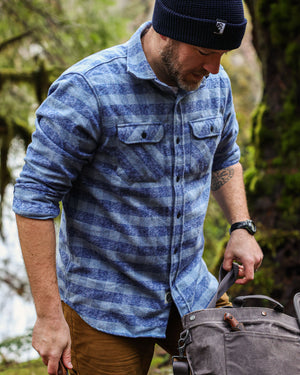
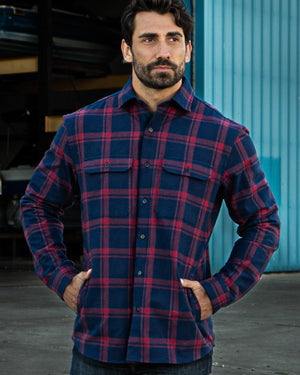
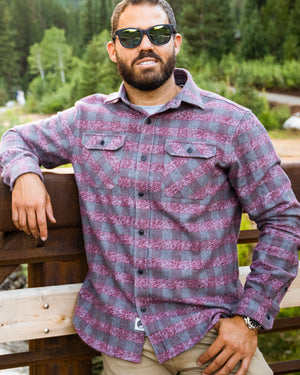
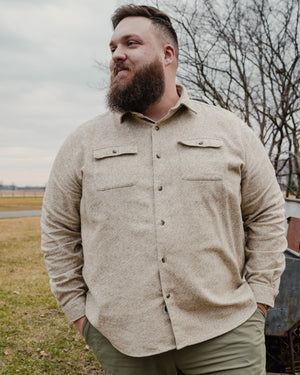
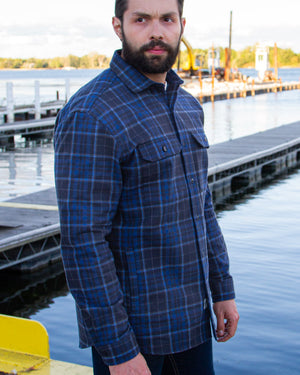
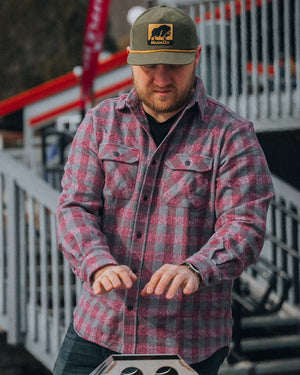

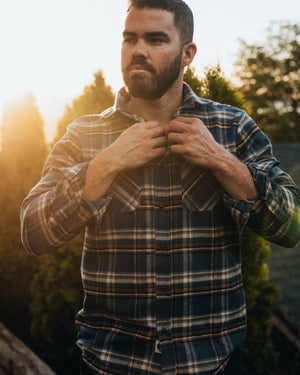
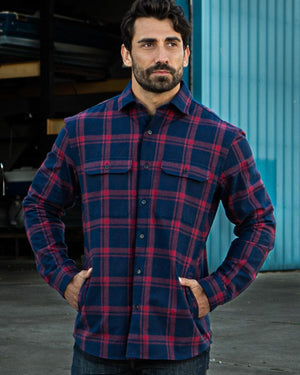
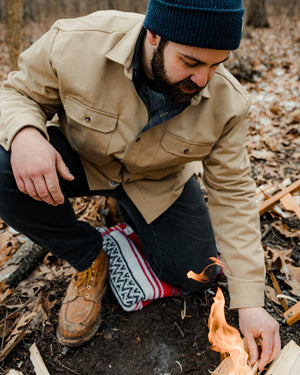

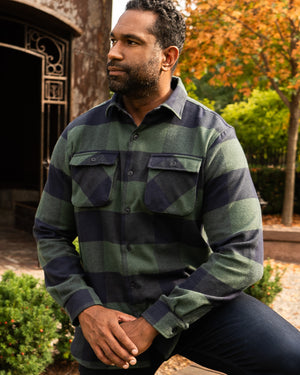





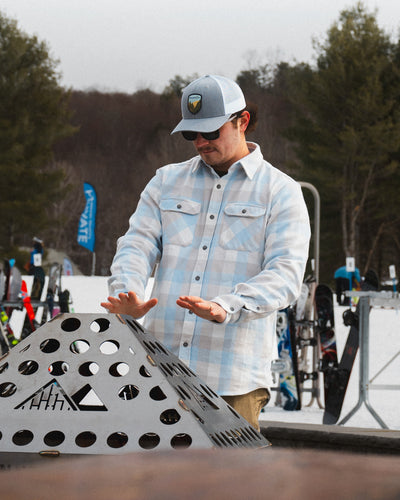



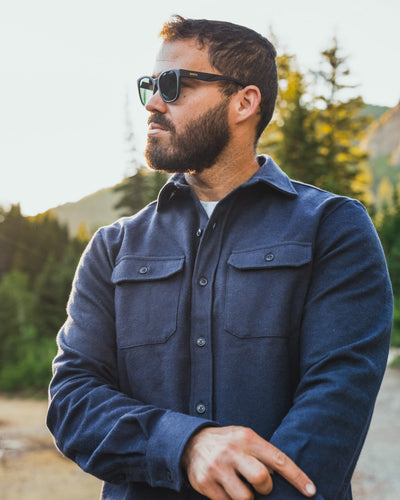



Leave a comment